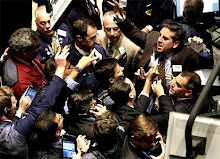The financial crisis has left behind a "slow disease" that is eating into financial markets, and this is obvious in stock prices and currencies, but less so in bonds for the moment, Mohamed El-Erian, CEO and co-chief investment officer of Pimco, told CNBC Tuesday.
"The standing of our financial markets is getting eroded every day, volume gets thinner. It's like a slow disease," El-Erian said.
The same thing is obvious in currency markets and in commodities, while "the bond market is pricing in the impact of someone with a printing press being a buyer," he added.
Minutes of the latest Federal Open Market Committee meeting will be released later Tuesday and investors will get a chance to see how close the Federal Reserve is to launching a second round of asset-buying, or quantitative easing.
The minutes will show if the Fed has revised its growth projections lower for the US economy, and by how much, and the minutes will also indicate where the central bank is on its path to more money printing, according to El-Erian.
"I suspect that, on the whole, the FOMC is ready is move on with (more quantitative easing) in November," he said.
But investors should look for the details of quantitative easing as well, such as whether the Fed will extend the class of assets it buys or whether it will proceed in small steps, El-Erian said.
Last week, St. Louis Fed president James Bullard told CNBC that the next FOMC meeting on whether to launch the second round of quantitative easing will be a "tough call."
"I think it's a reflection that people know that QE2 will not be fully effective," El-Erian said, adding that "in a perfect world the Fed wouldn't be doing all the heavy lifting by itself."
The International Monetary Fund meeting at the weekend, which ended without any clear resolution regarding the race to devalue currencies across the world, shows that there is no will to solve the problem, he said.
"What this weekend told us is that the only response is to kick the can down the road," El-Erian said.
"I worry more about the global standing of the dollar ... you can't beat up a reserve currency forever," he added.
A dollar demise could lead to a fragmentation of asset allocation by world investors and "a more fragmented system works less well globally," El-Erian said.
Tuesday, October 12, 2010
Subscribe to:
Comments (Atom)

